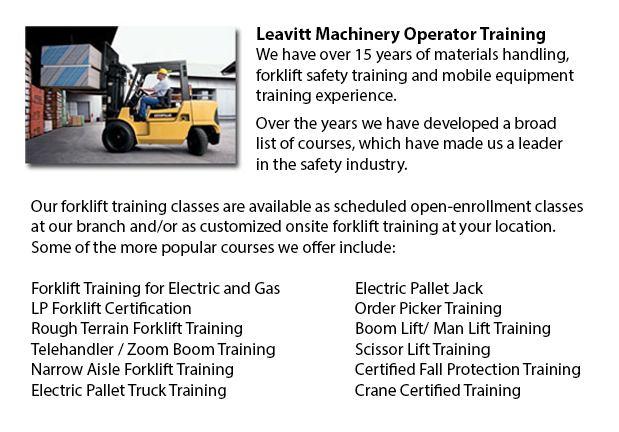
Forklift License Moose Jaw - In North America, acquiring a forklift license or forklift certification involves classroom and hands-on training. Regulatory control over licensing, certification and training for powered industrial truck operators falls under the jurisdiction of state, provincial and federal groups. Operators may acquire a license either by a third party or through training administered by the employer. In any case, regulatory requirements need to be met. Recertification is needed every two to three years.
The lift truck is a powered industrial equipment which is designed with different alternatives, such as sit-down and stand-up models, propane and electric versions, and different types and sizes to meet the industrial needs of workers. Operator training programs are often individualized to address the particular types and uses for which the operator is training. Training on a sit-down, gas-powered lift truck within a warehouse surroundings would not be the same as training on a propane-powered, stand-up lift truck in a shipyard. The variety of lift trucks and their uses makes it impossible to establish universal licensing requirements for all businesses and machinery. Regulatory standards, thus, tend not to focus on specific course requirements but instead on the results of individual training courses.
On the job training which is provided by the employer is the most common method of forklift training licensing and certification. The employer who provides this method of certification is needed to provide classroom sessions and practical training on equipment at their place of work. Employers could choose to train employees on each and every kind of forklift separately, or to train them on all machines combined. The course incorporates forklift operation methods, forklift maintenance, safety measures and company regulations. Topics particular to the worksite, like dangerous materials or conditions, must be covered. Following classroom learning, operators are taught how to safely use and operate every type of forklift on the worksite.
Certification through a third-party vendor usually requires an on-site component together with hands-on practice.
Usually, a certification provided by an employer would not transfer from the current employer to the next employer. Receiving a forklift license through employer-provided training enables the operator to operate a forklift for that employer only.
The most important factor of forklift license training is forklift safety. The exact safety training requirements differ from one kind of machinery to another. Safety issues differ from employer to employer, and from industry to industry. Both employer-provided training and third-party providers might have to deal with extra requirements for safety training in applicable industries, such as in offshore and marine uses.
-
Telehandler Training Courses Moose Jaw
Telehandler Training Courses Moose Jaw - Employers are responsible for making sure that their supervisory and operating personnel are trained to work competently making use of telehandler equipment. The competence level of workers need to be assessed... More -
Boom Lift Ticket Moose Jaw
Boom Lift Ticket Moose Jaw - Boom Lifts are a platform lift piece of equipment that could be lifted or lowered to differing heights, making this device a helpful instrument for certain industrial functions. There are some unique types of Boom Lift co... More -
Operator Safety Training, Re-Qualification Training, In-House Instructor Training in Moose Jaw
Utilized in nearly all industrial construction sites, warehouse operations or boat yards, the lift truck is a very important part in order to help lift and transport goods. The reach feature of a lift truck can help better the applications that the l... More -
Heavy Equipment Training Schools Moose Jaw
Heavy Equipment Training Schools Moose Jaw - There are many heavy equipment training schools to choose from. If you want to get to the best, it is important to examine several factors of the school in order to determine the level of education you wil... More -
Counterbalance Forklift Training Moose Jaw
Counterbalance Forklift Training Moose Jaw - Demand is always high for our popular Counterbalance Forklift Truck Training courses. A Counterbalance forklift refers to a forklift along with a weight that counters the balance, enabling the load's weigh... More -
Forklift Training Program Moose Jaw
Forklift Training Program Moose Jaw - Lift trucks are occasionally referred to as jitneys, hi los or lift trucks. These powered industrial trucks are utilized widely today. Department stores used forklifts in order to unload merchandise from trailers... More -
Forklift Ticket Moose Jaw
Forklift Ticket Moose Jaw - Pallet jacks and forklifts are both intended for practically the same reason; to transfer goods from a place of your warehouse to another. This is basically where the comparison stops however. With the pallet jack, the ben... More -
Forklift Operator Certification Moose Jaw
Forklift Operator Certification Moose Jaw - Forklift operator certification is normally needed for employees working in construction, warehouse or industrial setting to guarantee the safe operation of forklifts. Workplace training has to follow a met... More

Forklift Training Moose Jaw
TOLL FREE: 1-888-254-6157
Moose Jaw, Saskatchewan
forklifttrainingmoosejaw.com
Email Us
About Us


